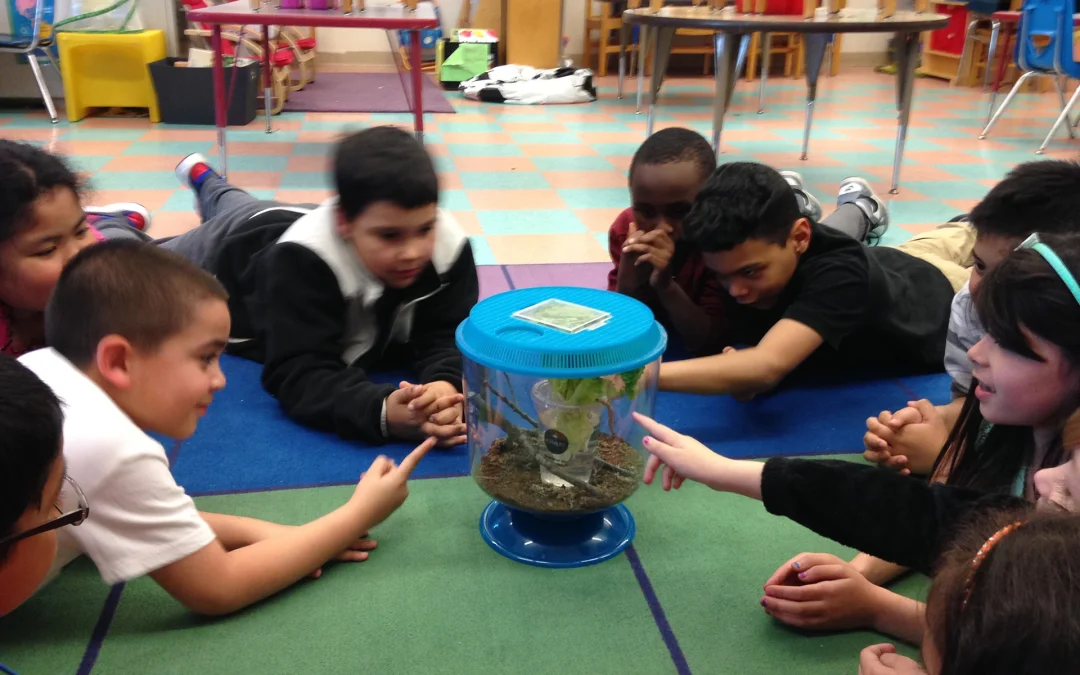
by Seema Bux | Mindful Activities, Practices for Kids
Learn about the advantages and challenges of introducing mindfulness programs in educational settings. Explore the positive impact of mindfulness on students’ well-being and academic performance.
Finding Quiet in the Classroom: Implementing Mindfulness Programs in Schools
Amidst the ever-growing pressures of academic achievement and standardized testing, a new movement is finding its way into the halls of schools: mindfulness. This practice, emphasizing present-moment awareness and non-judgmental acceptance, offers potential benefits for both students and educators, leading to a more positive and focused learning environment.
The Blossoming Benefits of Mindfulness in Schools:
- Enhanced Emotional Regulation: Studies show that mindfulness practices like meditation and breathing exercises can equip students with tools to manage stress, anxiety, and challenging emotions, fostering inner peace and resilience.
- Improved Focus and Attention: Mindfulness practices, such as mindful breathing or body scans, can help students develop greater focus and attention, which can enhance their ability to concentrate in class and perform better academically.
- Increased Social-Emotional Learning (SEL): Mindfulness practices cultivate empathy, compassion, and self-awareness, crucial skills for navigating social interactions and building healthy relationships with peers and teachers.
- Reduced Teacher Stress and Burnout: Educators face unique challenges, and mindfulness techniques can offer them much-needed tools for managing stress, improving emotional well-being, and creating a calmer classroom environment.
- Better Conflict Resolution: Mindfulness helps students develop empathy, compassion, and conflict resolution skills, enabling them to navigate interpersonal relationships more effectively and peacefully.
Planting the Seeds: Challenges and Considerations:
While the potential benefits are promising, implementing mindfulness programs in schools requires careful planning and consideration of some potential challenges:
- Finding Time and Resources: One of the main challenges of implementing mindfulness programs in schools is finding time & resources within the already packed curriculum to incorporate mindfulness practices. Educators may struggle to balance academic requirements with mindfulness instruction.
- Teacher Training and Support: Effective implementation requires trained teachers who understand and can authentically deliver mindfulness practices. Providing ongoing support and training is crucial.
- Cultural Sensitivity and Inclusivity: Mindfulness practices and terminology should be adapted to be culturally sensitive and inclusive of diverse backgrounds and beliefs.
- Sustainability: Maintaining a long-term commitment to mindfulness programs can be challenging, especially if there are changes in school leadership or funding priorities. Schools need to establish sustainable structures and resources to support ongoing mindfulness initiatives.
- Evaluation and Measurement: Assessing the impact of mindfulness programs on student outcomes can be difficult, as measuring the effectiveness of mindfulness practices requires appropriate evaluation tools and methodologies. Schools need to establish clear metrics for assessing the benefits of mindfulness programs.
Nurturing Growth: Overcoming Obstacles and Seeing Success:
Despite the challenges, numerous schools worldwide have successfully implemented mindfulness programs with positive results. Here are some key strategies:
- Start Small: Begin with short, simple practices like mindful breathing exercises or focusing on the senses, gradually integrating them into existing routines.
- Engage Stakeholders: Get buy-in from teachers, administrators, parents, and students, tailoring the program to their needs and concerns.
- Partner with Experts: Collaborate with organizations or individuals experienced in delivering mindfulness programs in educational settings.
- Gather Data and Share Results: Track progress and share positive outcomes to build momentum and secure continued support.
Despite these challenges, the benefits of implementing mindfulness programs in schools far outweigh the obstacles. By promoting focus, emotional regulation, stress reduction, well-being, and conflict resolution among students, mindfulness practices can create a more positive and supportive learning environment that enhances academic achievement and overall student success. With careful planning, training, and support, schools can successfully integrate mindfulness into their curriculum and empower students with valuable life skills that will benefit them both inside and outside the classroom.

by Seema Bux | Building Resilience, Coping with Stress
Strengthen the family bond through mindful resilience-building activities. Explore how mindfulness can help families overcome adversity and grow closer together.
Building Family Resilience: Strengthening the Bond in Times of Challenge
Life throws curveballs. From everyday stressors to major upheavals, families face challenges that test their strength and unity. But within each family lies a powerful force: resilience. By nurturing this innate ability to adapt and overcome, families can not only weather the storm but emerge stronger, closer, and more connected.
What is Family Resilience?
Family resilience is the ability of a family to withstand and bounce back from difficult situations, adapt to change, and grow stronger through adversity. It involves fostering a sense of unity, communication, and mutual support among family members, as well as developing coping skills and strategies to navigate challenges together. Building family resilience is not only important for weathering tough times but also for promoting positive relationships, emotional well-being, and overall family cohesion.
This inner strength comes from several key factors:
- Strong relationships: Trust, open communication, and empathy create a safe space for sharing feelings and seeking support.
- Positive communication: Expressing appreciation, focusing on solutions, and actively listening builds understanding and reinforces the bond.
- Problem-solving skills: Working together to tackle challenges fosters collaboration and teaches valuable coping mechanisms.
- Shared values and goals: Having a common purpose unites family members and provides direction during trying times.
- Adaptability and flexibility: Embracing change and being open to new solutions allows families to adjust to unexpected circumstances.
Building the Bonds of Resilience:
Another important aspect of building family resilience is fostering a sense of unity and teamwork within the family. Encouraging shared activities, traditions, and rituals can help create a sense of belonging and togetherness among family members. Whether it’s cooking meals together, playing games, going on family outings, or celebrating holidays and milestones, these shared experiences can strengthen the bond within the family and create lasting memories that help sustain them during challenging times.
Practical ways to cultivate family resilience
Here are some practical ways to cultivate family resilience:
- Create rituals and traditions: Shared activities, big or small, build a sense of belonging and stability. From weekly game nights to movie nights, these moments strengthen the familial fabric.
- Practice open communication: Encourage honest and respectful dialogue, even during disagreements. Active listening and validating each other’s feelings fosters trust and understanding.
- Celebrate individual strengths: Recognizing and appreciating each member’s unique talents and contributions builds self-esteem and reinforces a sense of support within the family.
- Engage in shared activities: Volunteering, pursuing hobbies, or simply spending quality time together creates positive memories and reinforces shared values.
- Seek professional help when needed: Therapy can provide valuable tools for navigating complex challenges and strengthening communication skills.
Remember, resilience is a journey, not a destination. There will be ups and downs, but by prioritizing connection, communication, and problem-solving, families can build a foundation of strength that will carry them through any storm.
Building a resilient family is an investment in the future. Building family resilience is an ongoing process that requires commitment, effort, and intentionality from all family members. By prioritizing communication, unity, coping skills, and a supportive environment, families can strengthen their bond and develop the resilience needed to face life’s challenges with courage and grace. Through building a strong foundation of connection and support within the family unit, parents and children can navigate adversity together, grow closer in the process, and emerge stronger as a resilient and united family.

by Seema Bux | Practices for Kids, Mindful Activities
Instill gratitude and kindness in children with mindful practices. Learn how to nurture a positive and compassionate mindset in kids, enhancing their emotional development and social interactions.
Cultivating Compassionate Seeds: How Mindfulness Fosters Gratitude and Kindness in Children
In today’s fast-paced world, it’s easy for children to get caught up in a whirlwind of wants and expectations. But what if we could equip them with tools to appreciate the good, cultivate empathy, and spread kindness? Enter mindfulness – the practice of focusing on the present moment without judgment. This powerful tool holds the key to unlocking gratitude and kindness in children, laying the foundation for a more positive and compassionate future.
Mindfulness: The Stepping Stone to Appreciation
Mindfulness encourages children to pause, breathe, and truly notice their surroundings. Whether it’s the warmth of the sun on their skin, the taste of a delicious meal, or the laughter shared with loved ones, each moment becomes a treasure to be appreciated. This newfound awareness fosters a sense of gratitude, shifting their focus from what they lack to the abundance already present in their lives.
Gratitude Blooms into Kindness
As children learn to appreciate the good in their own lives, their hearts naturally open to the experiences of others. They begin to recognize that everyone around them has their own unique story, filled with joys and struggles. This empathy becomes the fertile ground where kindness can blossom.
Planting the Seeds: Activities for Every Age
The beauty of mindfulness is its simplicity. Here are some engaging activities to introduce your child to this transformative practice:
For Little Sprouts (Ages 3-5):
- Mindful Breathing Games: Blow bubbles and watch them float, focusing on the feeling of air leaving your mouth. Pretend to be a flower and breathe in the sunshine, then exhale like a gentle breeze.
- Gratitude Jars: Decorate a jar and encourage children to add something they’re grateful for each day, big or small. Share your own gratitudes to set the example.
- Mindful Walks: Take a nature walk and encourage children to use their senses. What can they see, hear, smell, and feel? Point out the little things – a ladybug crawling on a leaf, the warmth of the sun, the sound of birds chirping.
For Budding Blossoms (Ages 6-9):
- Mindful Coloring: Encourage coloring with focus and intention, paying attention to the colors and how they make them feel.
- Gratitude Journals: Dedicate a notebook for writing down things they’re grateful for each day. Encourage reflection and discussion about why they appreciate these things.
- Kindness Challenges: Choose a weekly kindness challenge, like holding doors open for others, donating toys, or writing compliments to friends. Track their progress and celebrate their acts of kindness.
For Flourishing Flowers (Ages 10+):
- Guided Meditations: Use guided meditations specifically designed for children to help them manage stress, focus their attention, and cultivate empathy. Many free resources are available online.
- Gratitude Circles: During family dinners or gatherings, take turns sharing something you’re grateful for and why. Listen attentively and celebrate each other’s perspectives.
- Random Acts of Kindness Projects: Brainstorm and implement projects that spread kindness in your community, like baking cookies for the elderly or organizing a litter cleanup.
Remember, consistency is key. Integrating mindfulness practices into your child’s daily routine, even for just a few minutes each day, can have a profound impact. By nurturing their appreciation for the present and fostering empathy for others, you’re equipping them with the tools to grow into compassionate and kind individuals, making the world a brighter place, one mindful breath at a time.
Conclusion
In conclusion, promoting gratitude and kindness in children through mindfulness is a powerful way to help them navigate the challenges of growing up in today’s world. By teaching kids to be present, appreciative, and empathetic, we can empower them to become compassionate and caring individuals who will make a positive impact on the world around them. Let us commit to nurturing these qualities in our children through the practice of mindfulness, so that they may grow up to be kind-hearted and grateful individuals who spread love and positivity wherever they go.

by Seema Bux | Mindful Relationships, Family Communication, Mindful Communication, Resolution Strategies
Improve family relationships through mindful communication. Discover effective techniques to listen mindfully, express emotions compassionately, and create a harmonious family dynamic.
Mindful Communication: Building Stronger, Deeper Connections in Your Family
The dinner table erupts, tensions simmer, and words fly – sound familiar? Family life can be a beautiful tapestry woven with love, laughter, and support, but it can also unravel into misunderstandings and hurt feelings. That’s where the magic of mindful communication comes in.
Mindful communication is about consciously connecting with yourself and others on a deeper level. It’s about stepping off autopilot, choosing your words intentionally, and actively listening to understand, not just to reply. Imagine it as a superpower, transforming everyday interactions into opportunities for strengthening your family bonds.
Here are some key practices to unlock the power of mindful communication:
1. Be Present:
Put away distractions, silence your phone, and make eye contact when communicating. Show your family you’re fully engaged and invested in the conversation.
2. Listen Actively:
This goes beyond simply hearing words. Listen with your heart, trying to understand the emotions and experiences behind what’s being said. Ask clarifying questions, paraphrase to confirm understanding, and avoid interrupting.
3. Speak with Kindness:
Choose your words with care, focusing on what you want to achieve rather than blaming or attacking. Express your feelings honestly but respectfully, acknowledging the other person’s perspective.
4. Practice Empathy:
Step into your family member’s shoes and see things from their point of view. Validate their feelings, even if you disagree with their actions. This fosters trust and creates a safe space for open communication.
5. Acknowledge and Manage Your Emotions:
Before reacting, take a moment to identify your own emotions. Are you feeling frustrated, hurt, or overwhelmed? Take a deep breath and choose a response that comes from a place of calmness and understanding.
6. Use “I” Statements:
Instead of accusatory “you” statements, express your feelings and needs using “I” statements. This promotes ownership and reduces defensiveness. For example, instead of saying “You never help me,” say “I feel hurt when I have to do all the chores alone.”
7. Celebrate Positive Moments:
Focus on appreciating and acknowledging each other’s contributions, big and small. Express gratitude for your family members and the joy they bring to your life.
8. Practice Mindfulness Together:
Engage in activities that cultivate mindfulness as a family, like shared meditation sessions, mindful walks, or simply focusing on the present moment during meals. This strengthens your emotional intelligence and communication skills together.
Remember, mindful communication is a journey, not a destination. There will be moments of misunderstanding and missed connections. But by practicing these strategies and making a conscious effort to connect with each other, you can build a family culture of open communication, empathy, and mutual respect. The rewards are priceless: stronger bonds, deeper understanding, and a family that thrives on connection, not just survives on proximity.
Additional Tips:
- Be patient and consistent.
- Make time for regular, quality conversations.
- Seek professional help if needed.
- Remember, communication is a two-way street.
By embracing mindful communication, you can cultivate a more peaceful, loving, and connected family environment. So, take a deep breath, start small, and watch your family relationships blossom!

by Seema Bux | Mindful Living
Happy Hearts: Infusing Mindfulness Into Family Life
In our fast-paced world, filled with distractions and demands, cultivating a sense of calm and connection within the family can feel like an uphill battle. However, the practice of mindfulness offers a powerful tool to navigate the chaos and nurture joy and understanding in your household. Mindfulness is the simple act of focusing your attention on the present moment without judgment, and it’s surprisingly accessible and impactful, even for busy families.
Why infuse mindfulness into family life?
The benefits of mindfulness are numerous, impacting both individual and collective well-being. For children, mindfulness practices can:
- Reduce stress and anxiety: Mindfulness equips children with tools to manage difficult emotions and navigate overwhelming situations.
- Improve focus and attention: By learning to be present in the moment, children can enhance their ability to concentrate and learn.
- Increase self-awareness: Mindfulness helps children connect with their inner world, fostering self-compassion and emotional intelligence.
- Strengthen communication and connection: Shared mindfulness practices create opportunities for families to bond and listen deeply to each other.
For adults, mindfulness can:
- Reduce parental stress and burnout: Mindfulness techniques can help manage daily pressures and cultivate inner peace.
- Improve communication and empathy: By being present and attentive, parents can listen more effectively and connect with their children on a deeper level.
- Create a more positive and peaceful home environment: When adults embody mindfulness, it sets a positive tone for the whole family.
Simple Steps to Happy Hearts:
1. Start small:
Begin with short, manageable practices. A few minutes of mindful breathing each day can work wonders.
2. Make it playful:
Incorporate mindfulness into everyday activities. Use “mindful moments” during mealtimes, bedtime routines, or car rides. Focus on senses: the taste of food, the warmth of blankets, the sounds of nature.
3. Engage all ages:
Age-appropriate mindfulness exercises are readily available. Use guided meditations, coloring pages with calming prompts, or simply engage in mindful movement and stretches together.
4. Be present, not perfect:
Don’t strive for perfection. Embrace the giggles, distractions, and occasional meltdowns that are part of family life.
5. Lead by example:
Children learn best by observing. Integrate mindfulness into your own daily routine and let your children witness the positive impact.
Remember, mindfulness is a journey, not a destination. Be patient, celebrate small victories, and enjoy the process of creating a more mindful and connected family life. With consistent practice, “Happy Hearts” will become more than just a title; it will become a reality in your home.
Additional Resources:
By infusing mindfulness into your family life, you’re not just creating a calmer household; you’re nurturing happy hearts and building a foundation for lifelong well-being. So, take a deep breath, be present, and start your journey towards a more mindful and joyful family today.





